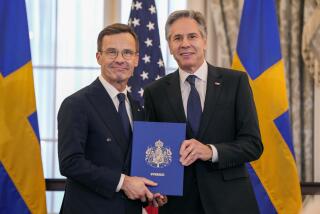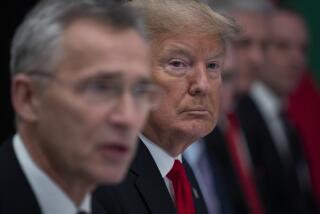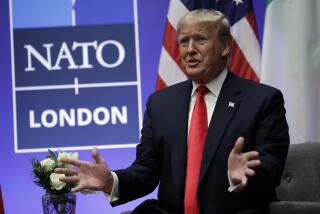Saudis want a NATO-type alliance with U.S.; Obama should say no
This week, President Obama is meeting with foreign ministers from Saudi Arabia and the other Gulf states who are urging him to create a NATO-like security agreement that pledges the United States to defend all of them in the event of an enemy attack — with Iran being the most likely antagonist. Obama does not seem inclined to make that commitment, and that’s a good thing.
The North Atlantic Treaty Organization was formed in 1949 to place an American nuclear shield between the Western European democracies that had been devastated by the Second World War and the Soviet Union that had already set up Communist vassal states throughout Eastern Europe. American protection and assistance allowed France, Britain, West Germany and other allies to rebuild and, eventually, reunite with the rest of Europe when the Soviet system finally collapsed.
NATO saved democracy in Europe and created the space for development of the European Union. It has been the most enduring alliance in history, and one measure of NATO’s success is that it prevented wars from ever happening. The most notable invocation of NATO’s mutual defense treaty came, not with an attack on Europe, but an attack on the United States by the terrorists who struck on Sept. 11, 2001. And many of those terrorists were from Saudi Arabia.
There is almost nothing that is analogous between the situation in Europe in 1949 and the situation in the Middle East today. Back then, there was one clear adversary, the USSR, and the allies we pledged to protect shared the same Enlightenment values as Americans.
Today, who is the enemy and who is the friend?
The Saudis have worked closely with a long line of American presidents. We got their oil and they got our weaponry and, on occasion, our soldiers to fight their fights for them. This has been less a friendship than a business deal. Meanwhile, Saudi rulers maintain a hereditary monarchy that is brutal with dissenters and retrograde in attitudes toward women and anyone with religious views that vary from their strict version of Sunni Islam. Many of their petrodollars have gone to finance dogmatic religious schools and preachers who spread a militant version of Islam throughout the region, thus spawning many of the terrorists with whom the U.S. is locked in perpetual war.
Nevertheless, the Saudis are sworn enemies of the Shiite Muslim ayatollahs who rule Iran, which is, of course, the country where, during the Islamic Revolution in 1979, American embassy workers were held hostage and where, now, the Iranian drive to get nuclear weapons has brought sanctions from the West. The foreign ministers of the Gulf states have a simple argument for the president: Iran is our common enemy; therefore we are friends and deserve to be defended as much as France or Germany.
But, of course, it is not that simple. Right now, the administration’s biggest worry in the Middle East is the Islamic State (also known as ISIS), the multinational army of terrorists that rose out of the civil war in Syria, spread into Iraq and is inspiring would-be holy warriors in Europe and the U.S. to commit random acts of violence. The regime Americans set up in Iraq after a miserable decade-long incursion is fighting Islamic State and, apart from the U.S. military, the Iraqis’ staunchest ally in that fight is Iran. Both Iraq and Iran are backing Syrian President Bashar Assad as he fights Islamic State on his home ground. But Assad, of course, is also fighting rebels backed by the U.S. and the Europeans. The Saudis oppose both Assad and Islamic State and want Americans to commit more troops to fighting them both. They also hate Obama’s pending nuclear deal with Iran because, if Western sanctions against Iran are dropped in exchange for a moratorium on nuclear development, Iran’s economy will boom and Tehran’s influence will rise.
Complicated, right?
In terms of strict power politics, it makes far more sense to for the United States to seek rapprochement with the Iranians than to side with the Saudis against them. Iran’s theocratic rulers are awful and the radical militants who back them are worse. Still, there was a controlled but consequential election in Iran that installed a government that is significantly more moderate. Iran has a sophisticated political class and a large population of young people who are eager to move closer to the West. There is potential for significant change in Iran that could be encouraged by engagement, starting with a deal on nukes.
None of that can be said about Saudi Arabia.
Enough Americans have died fighting other people’s fights in the Middle East. There is no good reason to become even more deeply involved in a part of the world where it is not easy to tell the good guys from the bad.
More to Read
A cure for the common opinion
Get thought-provoking perspectives with our weekly newsletter.
You may occasionally receive promotional content from the Los Angeles Times.







